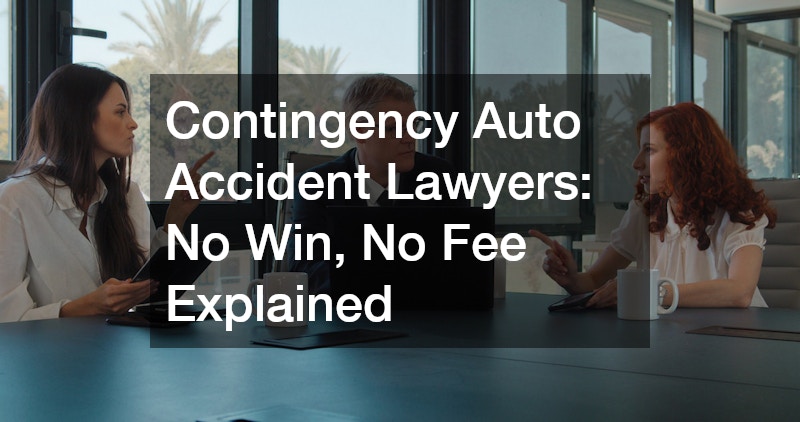
Insurance claims, especially those following a car accident, are rarely straightforward. Many policyholders assume their provider will deliver what is promised—until they’re met with an unexpected denial. At this critical juncture, auto insurance lawyers step in as vital allies. These legal professionals specialize in untangling insurance complications and ensuring individuals receive the compensation they’re owed. From understanding civil procedure to preparing for trial, their expertise can be the difference between a lost cause and a successful resolution. Whether your case involves a standard vehicle crash, a motorcycle collision requiring a motorcycle injury attorney, or a more complex liability scenario, legal guidance is crucial.
 What Are Auto Insurance Lawyers?
What Are Auto Insurance Lawyers?
Auto insurance lawyers are legal professionals who specialize in handling disputes between policyholders and insurance companies. Their responsibilities include interpreting policy terms, compiling necessary documentation, identifying bad faith practices, and advocating for the client’s best interests. These lawyers handle everything from claim delays to full-scale lawsuits involving multiple parties. They may work alongside a personal injury attorney in cases of bodily harm or a defense attorney when litigation becomes necessary. Their comprehensive knowledge of civil procedure ensures that filings, court motions, and deadlines are navigated efficiently and accurately.
It is advisable to consult a local lawyer as soon as you notice potential issues with your claim. This may include delayed responses, ambiguous denial letters, or requests for redundant documentation. Early legal intervention can prevent complications and help preserve essential evidence, like photographs from a vehicle inspection or receipts from a towing service. In cases of significant injuries or fatalities, legal guidance becomes even more critical to safeguarding your long-term financial and medical well-being.
Hiring a specialist offers distinct advantages in challenging insurance denials. These professionals understand the strategies insurers use to devalue claims and can counter them effectively. They know how to leverage accident documentation, such as estimates from an auto body collision repair company or workplace safety evaluations tied to OSHA training. By presenting credible and detailed information, they build compelling arguments that help maximize your compensation.
Why Would Your Insurance Claim Be Denied?
Insurance claims are denied for numerous reasons, ranging from minor clerical mistakes to complex policy exclusions. It is not uncommon for insurers to cite late paperwork, inconsistent statements, or insufficient evidence as grounds for denial. Sometimes, missing documentation like a vehicle inspection report or estimates from a towing service can lead to claim rejection. Even minor errors in your application or statements to insurance adjusters can trigger red flags and undermine your claim.
Policy exclusions and limitations often come as a surprise to policyholders. For example, if your accident occurred while using your vehicle for business purposes, your personal insurance policy might not apply. Similarly, incidents in private areas, such as a department store parking lot, might not be covered unless explicitly stated. It’s critical to review your policy thoroughly, as insurance providers often rely on these exclusions to justify denying compensation.
In many denied claims, misunderstandings and miscommunications are at the root of the problem. You might assume your coverage includes certain services, like roadside assistance, without realizing they require additional endorsements. Misinterpreting policy language or failing to report incident details accurately can quickly derail your claim. Having a local lawyer interpret the terms of your agreement and advocate on your behalf can clear up confusion and strengthen your case.
How Can Auto Insurance Lawyers Help?
One of the first tasks your lawyer will handle is evaluating your claim to determine its strengths and weaknesses. This evaluation includes examining your policy language, reconstructing the accident timeline, and reviewing key evidence such as auto body collision repair estimates and eyewitness accounts. If injuries occurred, the lawyer may consult a personal injury attorney or a motorcycle injury attorney to calculate damages. They also examine the insurer’s denial letter for inconsistencies, missing evidence, or legal misapplications.
Auto insurance lawyers are skilled negotiators and often settle cases without going to court. They use detailed records and expert analysis to challenge the insurer’s decisions and make a compelling argument for full compensation. Submitting supporting documentation from a reputable towing service or vehicle repair shop can further validate your claim. These professionals work to demonstrate the potential risk insurers face by refusing to pay, which often prompts quicker settlements.
If settlement fails and court becomes necessary, your lawyer will prepare all legal documents, engage in discovery, and represent you at trial. They will bring in additional experts, like OSHA training-certified professionals or licensed mechanics, to bolster your claim with technical insight. By ensuring strict adherence to civil procedure and court guidelines, your attorney minimizes delays and strengthens your legal standing.
 What to Expect During the Legal Process
What to Expect During the Legal Process
The legal process begins with an initial consultation, where you share your story, submit documentation, and receive a preliminary case evaluation. Your attorney will review your insurance policy, correspondence with your insurer, and any records related to the accident, such as repair shop invoices or photos from a vehicle inspection. This helps lay the groundwork for a strategic plan moving forward.
If informal negotiations fail, your lawyer will file a lawsuit to compel a formal review of your case. This step involves drafting a legal complaint, delivering it to the insurance company, and entering the discovery phase, where both sides exchange information. Civil procedure becomes especially important here, as missed deadlines or procedural errors can jeopardize your claim. An experienced attorney will manage this stage with careful precision.
The resolution phase can occur at any point, whether through mediation, arbitration, or trial. Most attorneys aim for a fair settlement to minimize court expenses and the emotional toll. If mediation proves successful, terms are drafted and approved by both parties. If not, the case may go before a judge or jury, where a final ruling is made. Throughout this process, your lawyer will keep you informed and prepared.
How Much Does It Cost to Hire an Auto Insurance Lawyer?
Most auto insurance lawyers operate on a contingency fee basis, meaning you only pay if your case is successful. This fee is typically a percentage of the settlement, often between 25% and 40%, and ensures that your lawyer is motivated to pursue the best outcome. For clients facing financial hardship from denied claims, this arrangement can provide peace of mind and access to quality legal support.
In addition to the contingency fee, there may be ancillary expenses to consider. These can include filing fees, expert witness compensation, and document processing costs. For example, bringing in a technician from an auto body collision repair company or a towing service operator as a witness may involve logistical expenses. Your lawyer will usually cover these upfront and deduct them from your final award.
When evaluating the cost of hiring a lawyer, it’s essential to consider the potential gains. A lawyer can help you recover not just the value of your car repairs, but also compensation for medical bills, lost wages, and emotional distress. Their expertise often results in higher settlements than what claimants typically receive when pursuing a case alone.
How Long Does it Take to Resolve a Disputed Claim?
Several factors influence how long it will take to resolve your case. These include the complexity of the claim, availability of key documents, responsiveness of the insurance company, and whether the matter is resolved through negotiation or litigation. Additional time may be needed if expert analysis or specialized reports, such as OSHA training assessments or vehicle inspection details, are required.
While some straightforward disputes can be resolved in a few months, more contentious claims may stretch on for over a year. If the case proceeds to court, the legal calendar and the judge’s availability can introduce delays. However, urgent circumstances, such as a claimant being unable to work, may expedite proceedings through legal motions or temporary relief hearings.
To ensure a faster resolution, clients should cooperate closely with their legal team. Providing complete documentation, such as towing service receipts, medical records, and repair estimates, can eliminate unnecessary delays. Promptly responding to inquiries and attending scheduled meetings also improves efficiency. A well-organized case often translates into a faster and more favorable outcome.
 What Should You Look for in an Auto Insurance Lawyer?
What Should You Look for in an Auto Insurance Lawyer?
When selecting an attorney, qualifications and relevant experience should top your list of considerations. A seasoned lawyer will have a track record of handling insurance disputes and a strong understanding of accident-related claims. If your incident involves unique circumstances, such as a department store injury or motorcycle crash, find someone with experience in those specific areas. Familiarity with local courts and regulations is also beneficial.
Online reviews and client testimonials can offer valuable insight into a lawyer’s effectiveness. Look for comments that highlight professionalism, consistent communication, and successful outcomes. While a few negative reviews are normal, patterns of dissatisfaction may signal red flags. Don’t hesitate to ask for references or examples of past case results during your consultation.
Your first impression matters. During your initial consultation, pay attention to how the lawyer listens and responds to your questions. They should offer clear, realistic expectations without pressuring you into immediate decisions. Trust is fundamental, and a confident, respectful demeanor can go a long way in fostering a strong attorney-client relationship.
Can You Switch Lawyers if You Are Unhappy?
It is entirely possible to change lawyers if your current representation isn’t meeting your expectations. Common reasons for switching include poor communication, lack of transparency, and insufficient progress on your case. You may also feel more comfortable with an attorney who has experience in a particular area, like vehicle inspection disputes or OSHA training testimony.
If you decide to make a change, consult your new lawyer first. They will help manage the transition, ensuring your case file is transferred and all necessary documentation is secured. The process is usually straightforward, and your original attorney may still be entitled to a portion of the fee, which will be resolved between the two firms.
Changing lawyers mid-case may introduce temporary delays, but the long-term benefit of having better representation often outweighs the disruption. A fresh perspective can bring renewed energy and strategic direction, especially in complex or stalled cases. The key is to make the transition early enough to avoid impacting your overall outcome.
Are There Alternatives to Using an Auto Insurance Lawyer?
In some situations, mediation can be a viable alternative to litigation. This process involves a neutral third party who facilitates negotiations between you and the insurance company. It is typically faster and less adversarial than court, making it ideal for disputes involving clear misunderstandings or smaller claim amounts.
While some individuals choose to represent themselves, this approach carries significant risks. Without a deep understanding of civil procedure and insurance law, you might miss filing deadlines or fail to present persuasive evidence. Additionally, insurers may take your claim less seriously if you’re not backed by legal counsel.
Although DIY methods can occasionally work in straightforward cases, they’re rarely advisable for high-value claims or situations involving injury. A denied claim involving medical bills, towing service disputes, or auto body collision repair costs requires a thorough legal strategy. The potential reward of hiring a lawyer usually far exceeds the short-term savings of handling the matter alone.
 What Are the Chances of Winning a Disputed Claim?
What Are the Chances of Winning a Disputed Claim?
Several factors influence your likelihood of success, including the quality of your evidence, the lawyer’s skill, and the insurance company’s willingness to negotiate. A solid case is built on clear documentation, expert evaluations, and a well-structured legal argument. Collaborating with experienced professionals, like a motorcycle injury attorney or OSHA training-certified expert, can significantly improve your odds.
Success rates are generally higher for individuals represented by legal counsel. Lawyers know how to interpret policy exclusions, present evidence effectively, and challenge weak points in an insurer’s argument. For example, submitting estimates from an established auto body collision repair company lends credibility to your claim and can encourage faster resolution.
To maximize your chances, hire a qualified attorney as early as possible, keep thorough records of all interactions and expenses, and be fully transparent about your case. Your cooperation, combined with your lawyer’s experience, forms the strongest foundation for a successful outcome.
When faced with a denied insurance claim, it’s easy to feel overwhelmed, frustrated, and unsure of where to turn. The fine print in your insurance policy, vague communication from adjusters, and unfamiliar legal jargon can all make the process seem impossible to navigate alone. That’s where auto insurance lawyers come in—they’re not just legal professionals; they’re your advocates, strategists, and, in many cases, the only barrier between you and financial hardship.
These specialists understand every aspect of the insurance claims process, from interpreting policy clauses to preparing airtight legal arguments. Their knowledge of civil procedure and courtroom dynamics ensures that your case is handled with precision and authority. Whether your claim involves property damage, bodily injury, or a dispute with your insurer about coverage, they are equipped to build a case that maximizes your chances of success.
If your situation involves specific types of accidents, such as a motorcycle collision or a department store injury in a parking lot, a motorcycle injury attorney or a personal injury attorney may be brought in to strengthen your legal strategy. Similarly, if evidence needs to be gathered from a vehicle inspection, auto body collision repair company, or towing service, a well-prepared attorney will know how to source, authenticate, and present that information effectively.
In many cases, the denial of a claim is due to avoidable errors or miscommunications. Insurance companies may use these small issues as justification to reject or underpay claims. A local lawyer, who understands the practices of regional insurers and has likely dealt with similar cases, can help clarify and resolve these issues quickly. In more complicated cases, lawyers may bring in additional professionals, including those with OSHA training, to provide expert testimony or documentation to support your case.
At the end of the day, an insurance policy is a promise, and you have every right to hold the insurer accountable. Don’t let a denial define your outcome. With the right legal guidance, you can challenge that decision, pursue the compensation you deserve, and reclaim control of your financial future.


